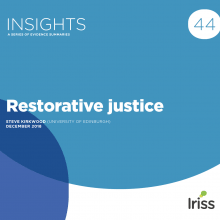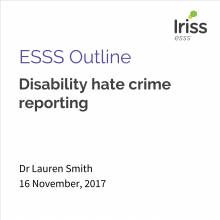Summary of research
The intersection between young people’s experiences of care and involvement in offending behaviour has received increasing academic and policy attention in recent years. To date, however, the topic has arguably received lesser attention and analysis from a Scottish policy and practice perspective. This research brings together key knowledge on the subject from a range of sources, applies critical analysis aided by social work theory and formulates the results towards developing a model of best practice for those working in social work and justice settings in Scotland.
The research explores how looked-after children have faced discrimination and been labelled as ‘troublemakers’ for generations. It presents statistics which illustrate how care-experienced people are disproportionately criminalised and over-represented in justice systems across Scotland, the UK and internationally. It analyses how the individual, social and criminogenic needs of looked-after children and care leavers are often traumatic, complex and affected by experiences of rejection, which often excludes them from ‘pro-social’ participation in mainstream society, leading to increased criminalisation.
The research explores how discrimination, negative societal attitudes and media influence has resulted in the social construction of care-experienced people as ‘risky’, and illustrates how this leads to worse outcomes, increased surveillance, an unfavourable policy context and the further criminalisation of care-experienced people. The research moves on to analyse the youth justice system within Scotland, with a particular focus on ‘trauma-informed’ policy and practice. It illustrates how, despite good intentions and many commendable elements, the ‘welfarist’ principles of Scotland’s approach to justice are undermined by a fragmented and overly bureaucratic system, which is arguably not set up with the impetus to reduce the criminalisation of care-experienced people.
Lastly, the research presents a suggested model of best practice for those working in social work in justice settings to reduce the overcriminalisation of those with care experience. The model suggests an ambitious, innovative approach for practitioners and policy makers which spans the intersecting levels of individual practice, policy and wider societal change. It includes discussion on the needs for a rights-based, relationship-centred and trauma-informed approach to working with care-experienced people in the justice system. It suggests social work practitioners should play a key role in promoting a positive public discourse surrounding care-experienced people. The model also introduces considerations for the Scottish policy context, including discussion on the use of ‘diversion’, criminal disclosures, and the potentially criminalising impact of anti-social behaviour legislation.
Completed: April 2020.
About the author
Sam Armour began working in social services in 2009, soon after leaving school, at first in an administrative capacity before moving on to supportive roles working directly with adult social care service users in East Ayrshire. Between 2016-2020, he studied social work at University of the West of Scotland, while concurrently working in social care. Through his work and studies, he has had a range of diverse opportunities and experiences, and has developed interests in the fields of youth justice, anti-oppressive practice, technology-enabled care, self-directed support and the wider political context of social work.
Sam's experience of social work education, and working within social services, has been life changing. He has been inspired by what he has learned, and by many of those he has worked alongside, to take forward a human rights-based approach into practice that will help people become empowered and achieve better lives.
Copyright © 2020 Sam Armour. All rights reserved. The author has given permission for this work to be downloaded and shared in the attached format for educational purposes only. For other permissions, please contact the author.
Contact email: samarmour9@live.co.uk





